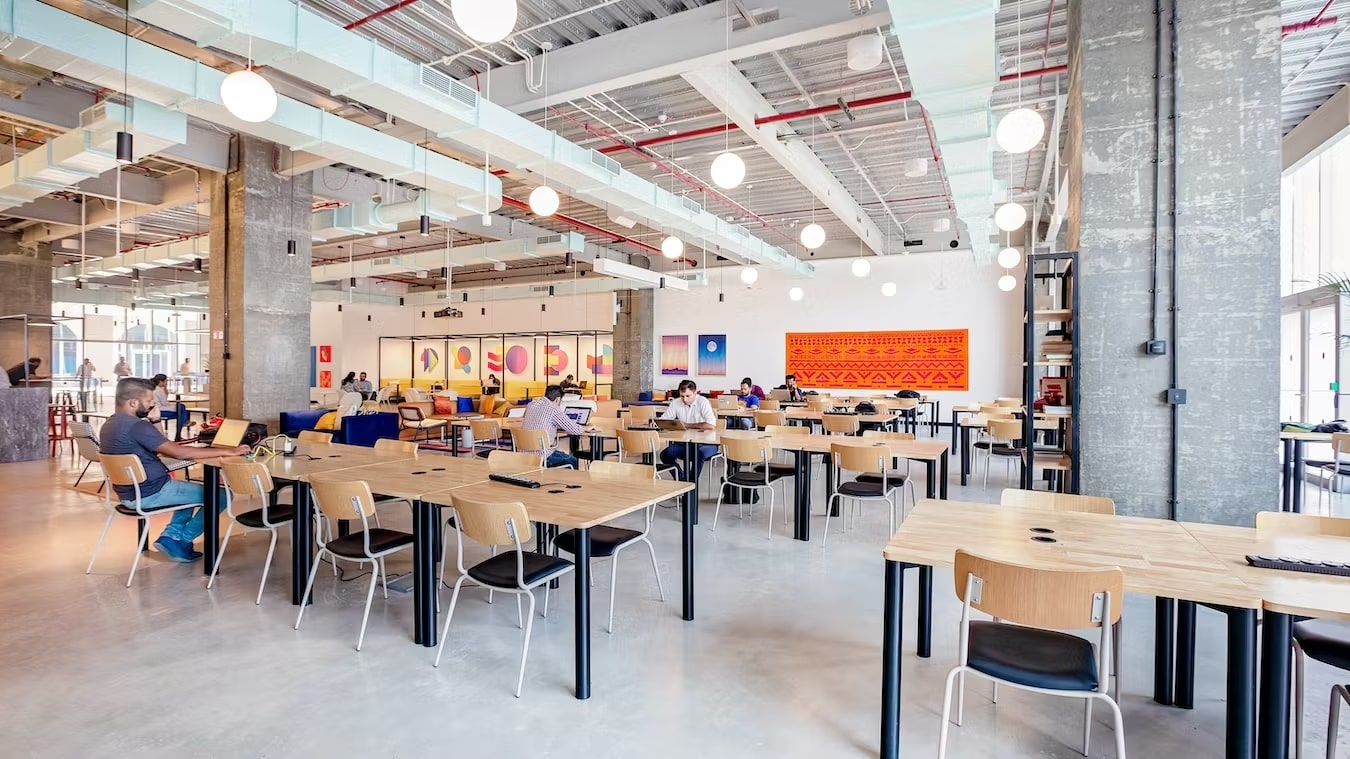Flexible office spaces offer a myriad of hard and soft, or tangible and intangible, benefits that can make a company’s real estate portfolio more agile and efficient.
In today's ever-changing business landscape, flexibility is key to maintaining a competitive edge. Flexible office spaces offer a myriad of hard and soft benefits that can make a company’s real estate portfolio more agile and efficient.
Through enabling businesses to adapt quickly to changing needs, flex spaces also reduce overhead costs by aligning space usage with actual demand. This adaptability enhances portfolio management by allowing companies to scale operations efficiently, optimising their real estate investments while maintaining operational agility.
This blog explores these benefits, focussing on the tangible, measurable advantages (hard benefits) and the intangible, experiential advantages (soft benefits) that flexible office spaces provide.
HARD BENEFITS: TANGIBLE & MEASURABLE ADVANTAGES
Traditional office setups, with their rigid leases and high overhead costs, often hinder a company’s ability to respond swiftly to changing market conditions. Enter flexible office spaces – a game-changer for modern businesses.
Research by The Instant Group shows global demand for flex is forecast to be up 23% in 2024 compared to pre-pandemic levels (2019), with no signs of slowing. Offering a range of measurable benefits, from scalability and cost efficiency to reduced downtime and strategic location flexibility, these dynamic workspaces are designed to meet the diverse needs of contemporary enterprises.
Here’s a closer look at why flexible offices might be the perfect solution for your business, thanks to their wide range of tangible advantages:
- Scalability - Flexible offices allow businesses to quickly adjust their space requirements as needs change. This scalability is essential for responding to market dynamics, expanding or reducing headcount, and avoiding the constraints of long-term leases. Already, this fact has led to occupiers of flex space shifting their contracts to reflect larger desk requests, with transaction sizes up 65% compared to pre-pandemic years and term lengths up 8%, according to The Instant Group data.
- Cost Efficiency - Flexible office spaces typically have lower overhead costs compared to traditional leases. They eliminate long-term commitments, reduce capital expenditure on furniture and fit-outs, and often feature all-inclusive pricing for utilities, cleaning, and security. Many flexible office spaces also bundle essential services into a single fee, reducing variable overheads and simplifying budget management.
- Reduced Downtime - With turn-key workstations, moving into or expanding within a flexible office space is rapid and straightforward. This minimizes downtime associated with setting up a new traditional office, ensuring business continuity and productivity.
- Location Flexibility and Visibility - Companies can establish a presence in prime locations without the high costs of permanent real estate investments. This strategic positioning enhances brand visibility and accessibility for clients and employees, supporting decisions to work near home or close to customers. With an Instant survey showing that 42% of people wanting to work from their company’s office, 23% from their home office, and 31% from coworking spaces, offering this type of location flexibility is crucial to employee satisfaction.
- Risk Reduction and Improved Business Continuity Planning - Shorter lease terms and flexible contract conditions mitigate risks associated with long-term financial commitments. This flexibility is particularly beneficial in uncertain economic climates, allowing companies to adapt quickly to market shifts.
- Access to High-Quality Amenities - Flexible office spaces often come equipped with premium amenities such as state-of-the-art meeting rooms, networking areas, cafes, and advanced technology infrastructures. Searches for amenity-specific offices alone have increased 18% over the past year, according to Instant data. Access to these resources without additional investment can therefore significantly enhance productivity and employee satisfaction.

SOFT BENEFITS: INTANGIBLE & EXPERIENTIAL ADVANTAGES
Flexible office setups are not just about physical space but also about empowering employees with autonomy, fostering a sense of community, and enhancing overall user experience.
These dynamic workspaces offer unique advantages that can transform the way businesses operate and how employees experience their workday.
In addition to tangible advantages, flexible office spaces can lead to increased autonomy, a stronger sense of community, and many other experiential benefits such as the following:
- Increased Autonomy - Flexible office setups support hybrid working patterns, giving employees the autonomy to choose when and where they work. Over the past year, 61% of flex occupiers said a hybrid work schedule has increased in importance, according to The Instant Group’s research. This flexibility can lead to higher motivation and job satisfaction.
- Sense of Community - Flexible office environments foster a strong sense of community among employees, encouraging connections and relationships that contribute to a supportive and inclusive workplace culture. To illustrate this, data from Instant confirms 44% of occupiers believe that having access to on-demand coworking spaces would positively impact their company culture.
- Improved User Experience - A well-designed flexible workspace can elevate the user experience by providing a vibrant office environment with minimal underutilised space, further enhanced by a sense of community. Since many flex offices are often designed with modern aesthetics and ergonomic features, they offer a more comfortable and stimulating work environment that improves daily work experiences.
- Networking Opportunities - Being part of a flexible office environment places businesses within a community of other companies and entrepreneurs, fostering networking opportunities, potential partnerships, and resource sharing that are less accessible in traditional office settings.
- Enhanced Employee Well-being - Many flexible offices offer amenities focused on health and wellness, such as gyms, yoga classes, and wellness workshops, supporting employees' physical health and mental well-being. Plus, flexible workspaces are often located closer to employees' homes, reducing commute times and enhancing work-life balance.
In conclusion, the hard and soft benefits of flexible office spaces provide businesses with the agility and efficiency needed to thrive in a dynamic market. By leveraging these advantages, companies can create a more adaptable, productive, and satisfying work environment for their employees.
This adaptability is crucial for effective portfolio management, as it allows businesses to optimise their real estate investments and respond swiftly to market changes.


